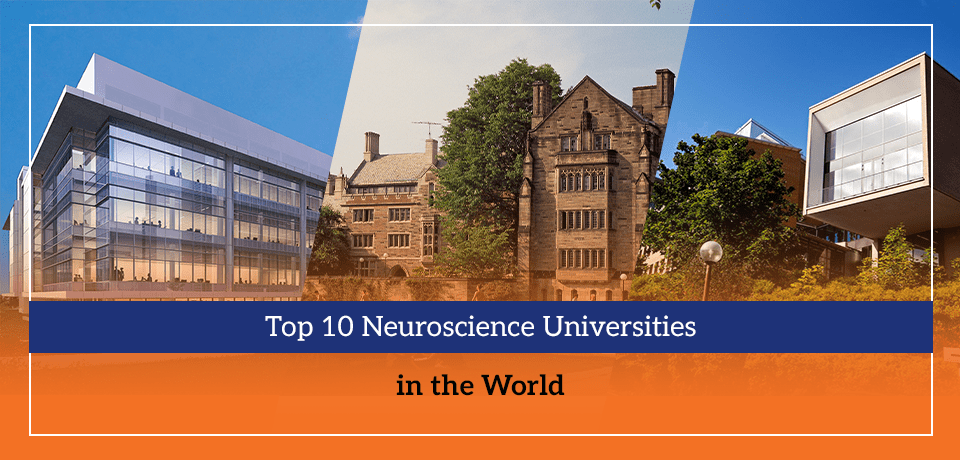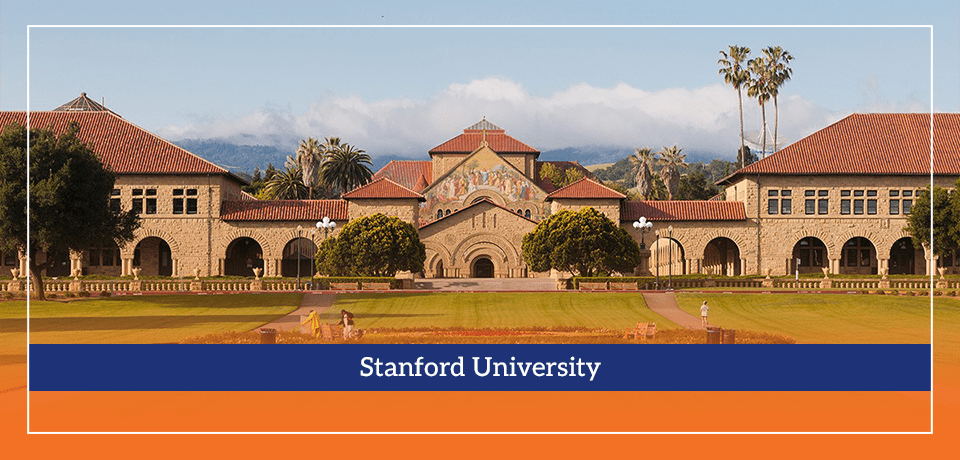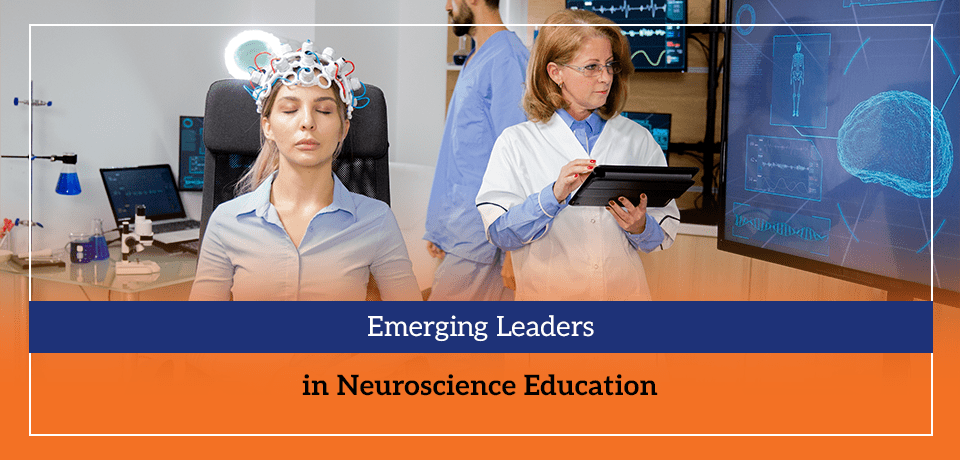Neuroscience applications have surged globally in the past five years, driven by advances in AI, neuroengineering and brain-computer interfaces. Choosing where to study isn’t just about prestige; it’s about finding the program that aligns with your future specialisation and career path.
Most students choose neuroscience programs based on rankings alone.
But here’s what they miss: The “best” program for computational neuroscience at MIT could be the worst choice for someone passionate about clinical neurology.
This guide reveals how the best neuroscience universities in the world actually differ. You’ll discover everything from neurotechnology programmes to neuroscience scholarships. Match your ambitions to the right institution.
How We Ranked the Best Neuroscience Universities
Our 2026 list is based on data from leading academic ranking sources, including Research.com and EduRank, supplemented by expert review of program details. We considered five key factors:
- Research Impact: citations, publications, and global collaboration index.
- Faculty Expertise: awards, cross-disciplinary leadership, and active student involvement.
- Facilities & Technology: access to neuroimaging, computational clusters, AI labs and hands-on equipment.
- Student Outcomes: alumni placements in academia, industry, neurology/clinical settings, and salary trajectories.
- International Accessibility: tuition, scholarship funding options, and visa ease for international students.
Because neuroscience encompasses very different flavours (clinical neurology, neuro-AI, cognitive neuroscience, neuroengineering), the “best” programme depends entirely on you. So, we rank and describe programs by specialisation and fit, not just prestige.
Key Factors to Evaluate the Best Neuroscience Universities
Research Reputation That Opens Doors
The strongest neuroscience departments prove their excellence through measurable research impact. Look for universities consistently publishing in high-impact journals, leading global collaborations, and attracting top-tier research funding. Institutions with a high D-index or citation count demonstrate real scientific influence and strong potential for mentorship.
Faculty Expertise That Shapes Your Career
Faculty are the backbone of your neuroscience education. Choose a program where professors actively involve students in research, supervise thesis projects, and collaborate across disciplines. Universities that connect neuroscience with fields like engineering, computer science, and psychology create richer opportunities and foster innovation beyond traditional boundaries.
Facilities That Enable Discovery
Cutting-edge neuroscience requires cutting-edge equipment. Prioritise programs offering access to advanced neuroimaging suites (fMRI, MEG), brain–computer interface (BCI) labs, electrophysiology facilities, and high-performance computing clusters. The best universities give students hands-on access to these resources from early in their degree, not just observation privileges.
Student Outcomes and ROI
A world-class education should translate into tangible results. Evaluate graduate outcomes such as placement rates, alumni research impact, start-up creation, and salary potential, plus the kinds of career paths graduates typically pursue. Top neuroscience programs combine academic excellence with strong networks in biotechnology, healthcare, and artificial intelligence, ensuring your degree delivers both intellectual and professional value.

Top 10 Neuroscience Universities in the World (2026 Update)
Below are the world’s most respected universities for neuroscience studies in 2026. Each institution offers unique research strengths, funding opportunities, and pathways into careers in neurotechnology, cognitive science, and clinical neurology.
1. Harvard University (USA)
Harvard University’s neuroscience program remains the global benchmark for academic and clinical research excellence. The Department of Neurobiology and the Harvard Centre for Brain Science lead in neurodegenerative disease research, synaptic plasticity, and neural development. Students gain access to NIH-funded labs, world-class hospitals, and collaborative programs with MIT.
The curriculum combines molecular neuroscience, cognitive neuroscience, and clinical translation, allowing students to bridge lab discoveries with real-world therapies. Harvard graduates are highly sought after in biotech, neurology, and research roles worldwide, especially for those exploring how to study in the USA as an international student.
Perfect for: Students seeking a neuroscience PhD or master’s program that integrates research prestige with clinical applications.
2. University College London (UCL, UK)
UCL ranks consistently among the best neuroscience universities in Europe thanks to its world-leading cognitive neuroscience and neuroimaging research. Its partnership with the Wellcome Centre for Human Neuroimaging and Queen Square Institute of Neurology offers direct exposure to pioneering studies in consciousness and neural computation.
Students benefit from London’s rich academic ecosystem and diverse international community, with plenty of quiet places to study across the city, with over 140 countries represented. The university’s focus on computational neuroscience, brain-mapping technologies, and mental-health innovation makes it ideal for global learners.
Perfect for: International students pursuing neuroscience degrees with an emphasis on cognition, AI, and mental health research.
3. Johns Hopkins University (USA)
Johns Hopkins is a powerhouse in neuroengineering, neurosurgery, and clinical translational neuroscience. Its Brain Science Institute links more than 100 faculty across departments, merging engineering, computing, and medicine.
Students experience early clinical exposure through the university’s teaching hospital network and gain hands-on experience in brain-computer interface (BCI) research, one of the fastest-growing neuroscience fields globally.
Perfect for: Learners who want a neuroscience education grounded in surgery, biomedical innovation, and real-world patient interaction.
4. Massachusetts Institute of Technology (MIT, USA)
MIT’s Department of Brain and Cognitive Sciences stands among the world’s best destinations for computational neuroscience and AI-driven brain research. The institute’s Building 46, one of the largest neuroscience facilities globally, houses advanced neuroimaging labs, machine-learning clusters, and robotics research units.
Students collaborate across computer science, biology, and electrical engineering, preparing them for careers in neurotechnology, cognitive modelling, and AI ethics. Graduates often move into roles at DeepMind, Neuralink, and other neuro-AI startups.
Perfect for: Students seeking a computational neuroscience degree blending artificial intelligence, engineering, and cognitive science.

5. Stanford University (USA)
Stanford University bridges neuroscience, innovation, and entrepreneurship through the Wu Tsai Neurosciences Institute. Students engage with Silicon Valley startups, venture capitalists, and biotech labs to translate neuroscience research into commercial solutions.
The program emphasises neurotechnology, neuroinformatics, and brain-machine interface design, giving learners real-time experience with next-generation medical devices and cognitive-computing applications.
Perfect for: Entrepreneurial students who want to combine neuroscience research with business innovation and startup creation.
6. University of Oxford (UK)
Oxford’s neuroscience program merges centuries-old academic heritage with modern leadership in neuroethics, cognitive neuroscience, and global health. The Oxford Centre for Human Brain Activity (OHBA) provides MEG and MRI facilities used for groundbreaking studies on human behaviour and neuropsychology.
Students engage with leading experts in philosophy of mind, AI ethics, and neurological disorder treatment, producing graduates who influence both science and public policy.
Perfect for: Students passionate about neuroscience’s ethical, societal, and clinical dimensions, and those aiming for global research careers.
7. University of California, San Francisco (UCSF, USA)
UCSF is one of the few universities dedicated exclusively to health sciences, giving its neuroscience students unmatched exposure to clinical neurology and Alzheimer’s research. Its Memory and Ageing Centre leads global efforts in dementia prevention and cognitive health.
Students work directly with neurologists and researchers at UCSF Medical Centre, gaining a practical understanding of translational neuroscience and neuropharmacology.
Perfect for: Students pursuing careers in clinical neuroscience, neurology, or neurodegenerative disease research.
8. Columbia University (USA)
Columbia’s Zuckerman Institute for Mind, Brain and Behaviour anchors its reputation as one of the top neuroscience universities in New York City. The program integrates neuroscience, psychology, and computational modelling in over 50 research labs.
Its Manhattan location places students near leading hospitals, biotech accelerators, and pharmaceutical companies, ideal for internships and applied neuroscience training.
Perfect for: Students who want to study neuroscience in a major city with access to industry partnerships and advanced cognitive-science research.
9. Karolinska Institutet (Sweden)
Karolinska Institutet leads Europe in neuroimmunology and neuropharmacology. Known for awarding the Nobel Prize in Physiology or Medicine, it offers programs that explore how the immune system affects brain function, vital for understanding Alzheimer’s, multiple sclerosis, and psychiatric disorders.
EU students enjoy low tuition, while international learners can access fully funded neuroscience scholarships and exchange opportunities across Europe.
Perfect for: Students seeking an affordable European neuroscience degree focused on immune-brain interactions and translational medicine.
10. University of Tokyo (Japan)
The University of Tokyo is Asia’s leader in neurotechnology, robotics, and brain-machine interface research. Collaborating with the RIKEN Brain Science Institute, students explore innovations in neural prosthetics, ageing-brain studies, and AI-driven rehabilitation systems.
The program combines Japan’s technological precision with global neuroscience standards, preparing graduates for cross-cultural research and high-tech healthcare roles.
Perfect for: Students pursuing neuroscience degrees in Asia, particularly those interested in robotics, neuro-AI, and rehabilitation science.
Comparison Table: Top Neuroscience Universities (2026)
|
University
|
Key Specialisation
|
Region
|
Approx. Annual Tuition*
|
Scholarships Available?
|
Why It Stands Out
|
|
Harvard University
|
Neurodegenerative diseases
|
USA
|
US $54,000
|
Yes
|
Massive funding, broad clinical research
|
|
University College London
|
Cognitive & computational
|
UK
|
UK £32,000
|
Yes
|
Imaging‐tech pioneer, high international intake
|
|
Johns Hopkins University
|
Neuroengineering
|
USA
|
US $60,000
|
Yes
|
Brain-computer interfaces, clinical adjacency
|
|
MIT
|
Computational neuroscience
|
USA
|
US $58,000
|
Yes
|
AI/neuroscience nexus, startup culture
|
|
Stanford University
|
Neurotechnology & startups
|
USA
|
US $62,000
|
Yes
|
Industry/startup access
|
|
University of Oxford
|
Neuroethics & global health
|
UK
|
UK £38,000
|
Yes
|
Ethical/global health angle
|
|
UCSF
|
Clinical neurology
|
USA
|
US $48,000
|
Yes
|
Hospital partnerships, patient-centric research
|
|
Columbia University
|
Urban neuroscience & biotech
|
USA
|
US $65,000
|
Yes
|
NYC biotech ecosystem, broad research scope
|
|
Karolinska Institutet
|
Neuroimmunology
|
Sweden
|
€0 (EU) / SEK 200k-350k
|
Very good for internationals
|
Focused specialisation, scholarship friendly
|
|
University of Tokyo
|
Robotics & brain interfaces
|
Japan
|
¥535,800
|
Yes
|
Asian leader in neurotechnology
|
*Fees are approximate for international students and subject to change.
Notably, the 2025 EduRank listing places Harvard at #1 globally for neuroscience research output.

Emerging Leaders in Neuroscience Education
While the Top 10 are elite, several other institutions are rapidly rising and worth attention:
These programmes offer more accessible entry and strong funding in certain sub-fields (e.g., neuro-AI, brain-computer interfaces). They may be ideal for students who prioritise fit and affordability over global prestige.
Best Countries to Study Neuroscience
If you’re deciding where to study, consider the overall ecosystem, research funding, visa support, and job demand. The top countries include:
- United States: Best for research diversity, high funding, but high cost.
- United Kingdom: Leading in cognitive neuroscience, and is internationally student-friendly for degree seekers.
- Germany: Tuition-free or low-cost for many programs, with public universities worth considering and strong neuro-tech clusters.
- Canada: Balanced cost, excellent post-graduate work visa options.
- Australia: Growing biotech and mental health neuroscience sector.
Country-Specific Insights
|
Country
|
Tuition Range
|
Visa Processing
|
Industry Demand
|
Typical Research Grants
|
|
USA
|
US $30k-60k
|
2-4 months
|
Very High
|
NIH: US $40+ billion (neuroscience scope)
|
|
UK
|
UK £20k-35k
|
3 weeks
|
High
|
Wellcome Trust, UKRI
|
|
Germany
|
€0-3k (tuition)
|
4-8 weeks
|
Growing
|
Max Planck, DFG
|
|
Canada
|
CAD 15k-30k
|
6 weeks
|
High
|
CIHR Funding
|
|
Australia
|
AUD 25k-40k
|
4 weeks
|
Moderate
|
NHMRC Grants
|
Key takeaway:
The USA dominates funding and research capacity, but costs are higher. Germany offers highly affordable programmes, especially for postgraduate/PhD populations. Always research scholarships, visa rules and language of instruction for your country of origin.
How to Choose Between Traditional vs Innovative Programmes
Traditional programmes emphasise foundational neurobiology, anatomy, and proven curricula, which are suitable if you aim for academic or clinical neurology tracks.
Innovative/tech-forward programmes integrate AI, big-data neuroscience, start-up culture, and brain-machine interfaces, ideal if you lean towards neurotechnology or computational neuroscience.
For example, at MIT you’ll find computational models, neural networks and AI rather than classic anatomy. At UCSF, you might spend more time in hospitals, dealing with patient cases and translational research.
5 Cutting-Edge Neuroscience Specialisations for 2026
- Neuro-AI & Ethics: Address bias in brain-computer interfaces and ensure equitable access to neural technologies (led by Oxford).
- Precision Neuromedicine: Develop personalised treatments using individual brain biomarkers (UCSF leads).
- Climate Neuroscience: Study how environmental changes affect brain health, from air pollution to heat stress.
- Hybrid Neuroscience/Neurobiology Programmes: “Neuroeconomics” at Zurich merges brain science with behavioural finance.
- Brain-Computer Interface Design: Create next-generation neural implants and non-invasive brain control systems (MIT/Stanford dominate this space).
By targeting one of these niches early, you’ll position yourself ahead of the curve and not just follow the crowd.
Career Pathways and Alumni Success Stories
Here are real-world career angles:
- Clinical research scientist: US $85,000-$150,000 for neuroscience postdocs or industry scientists.
- Neurotech development engineer: US $100,000-$200,000, with potential equity if you join a start-up.
- Neurosurgeon: US $400,000-$800,000+ (in developed markets) - requires MD + clinical training.
Example: An alumnus of MIT’s neuroscience/AI track co-founded a company that raised US $150 million for brain-computer interface implants.
Your path can be equally transformative, but only if you pick a programme aligned with your goal, not just the most famous name.

Frequently Asked Questions About the Best Neuroscience Universities
What are the prerequisites for a neuroscience degree?
You’ll need strong foundations in biology, chemistry, physics and mathematics. Many programs require calculus and organic chemistry. For PhD admissions, substantial research experience is usually required.
Which university has the best neuroscience research facilities?
While MIT’s Building 46 is often cited as one of the world’s largest neuroscience facilities, “best” depends on your research interest. For neurotechnology, choose MIT or Stanford; for clinical neurology, consider UCSF or Johns Hopkins.
Are online neuroscience programmes credible?
Some universities offer legitimate online master’s programmes in neuroscience. However, for a PhD, you will still need substantial campus-based hands-on training and lab experience.
How competitive are top neuroscience programmes?
Very. Some admit below 10% of applicants. Strong GPA, research output, publications/presentations and a well-crafted statement of purpose matter.
Which countries offer scholarships for international students pursuing neuroscience?
Germany is notable for low or no tuition; the EU’s Erasmus Mundus offers monthly stipends (e.g., approx. €850) for non-EU students. Always research country-specific neuroscience scholarships early; deadlines may come before admissions.
Can I pursue neuroscience without a medical background?
Absolutely. Physics, engineering, and psychology graduates thrive. Many computational neuroscientists come from non-medical backgrounds. Focus on acquiring biology prerequisites and lab experience if needed.
Which schools have the strongest industry partnerships?
Stanford (Silicon Valley) and MIT (startup ecosystem) lead in industry linkage; Boston-area schools like Harvard/MIT tap massive biotech clusters. Choose based on your goal (industry vs clinical vs academic).
What’s the difference between “neuroscience” and “neurobiology”?
Neuroscience covers cognitive, computational and behavioural aspects of the brain and nervous system. Neurobiology focuses more narrowly on biological mechanisms. If you aim to interface with AI, robotics, or behaviour, choose a “neuroscience” programme.
How important is research experience for admissions?
Critical. Internships, publications and presentations boost your profile significantly. Committees value sustained commitment to a lab or project; even high school research counts if you can show outcomes.
What are the top conferences for neuroscience students?
The Society for Neuroscience (SfN) annual meeting remains the premier event with 30,000+ attendees. Regional or student-focused conferences often offer more chances to present early. Budget US $1,000-2,000 for travel/presentation costs and plan ahead for student financing options if needed.
Conclusion
Every year, thousands of brilliant students enter neuroscience programmes. Only a fraction revolutionises the field. The difference? They chose programmes that amplified their strengths rather than compensated for weaknesses.
Whether you pursue computational neuroscience at MIT or clinical excellence at UCSF, alignment beats prestige.
The neuroscience landscape transforms rapidly. Top neuroscience schools for international students are expanding their funding, while emerging specialisations are creating unprecedented opportunities.
The best neuroscience universities in the world don’t just teach. They transform scientists into pioneers.
Now, stop researching and start applying.